
Lockdown may have encouraged more consumers to support businesses closer to home, yet, new findings suggest that this isn’t likely to be top of mind when it comes to buying habits this Christmas. Just 15 per cent of UK shoppers plan on basing their purchase decision on wanting to support local shops over larger chains.
The study by Fresh Relevance, the real-time personalisation and optimisation platform, reveals that for almost a third (31 per cent) of consumers, convenience and ease of shopping are going to be top of the list when it comes to buying gifts. Whilst staying healthy and safe wouldn’t usually be part of the decision process at Christmas, it is an important factor for 30 per cent of shoppers this year. Considerations to support the local community and environment will only play a minor role in consumer choices, with just 13 per cent seeking to buy from sustainable companies and just 14 per cent intending on basing decisions around supporting physical stores over online. Instead, value for money will be high on the agenda for 41 per cent of consumers, while just under a third (32 per cent) will base their gift buying decisions on discounts.
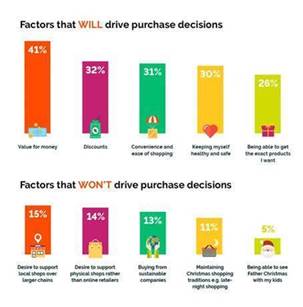
The “The New Normal Festive Shopping Report,” which surveyed 2,000 UK consumers in collaboration with Censuswide, suggests that despite Amazon’s increased sales during lockdown, it isn’t driving a significant shift in shopping behaviours this festive season, with just a 1 per cent increase in consumers planning on buying gifts primarily from Amazon compared to last year. There is a 6 per cent decrease in consumers who will now opt for purchasing primarily on the high street, dropping from 14 per cent in 2019 to 8 per cent in 2020. Online marketplaces like Ebay and Etsy and online retailers look set to benefit more from more Christmas shoppers, both increasing by 3 per cent this year.
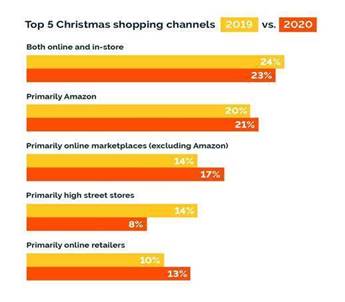
The study also reveals that despite the economic uncertainty, 38 per cent of UK consumers are intending on spending the same and 23 per cent on spending more this Christmas, compared to last. December will be the key shopping month for just over a quarter of consumers (26 per cent), whereas just under a quarter (24 per cent) do their purchasing throughout the year. Comparatively, the influence of specialist shopping events seems relatively low this year, with just 8 per cent of shoppers planning to complete much of their lists on Black Friday and Cyber Monday, and 7 per cent on Amazon Prime Day. Related to this, 44 per cent of consumers think Black Friday should be cancelled altogether this year due the risk to staff and shoppers.
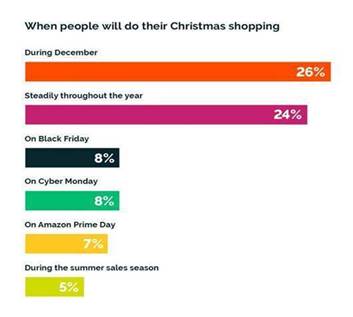
The findings also examine some of the potential pain points for those online this Christmas, with 29 per cent of consumers stating that one-size-fits-all festive marketing is irritating and a similar proportion finding irrelevant popups off-putting (28 per cent). For just over one in four (26 per cent), being followed online by retargeting ads for products they have browsed or purchased is annoying. The same proportion are displeased if they find a product they like is sold out online with no information provided if and when it will be restocked. In a similar vein, failing to provide information around in-store availability for products sold out online annoys 20 per cent of shoppers. 22 per cent find both receiving emails promoting products that are out of stock and repetitive sale messages frustrating.
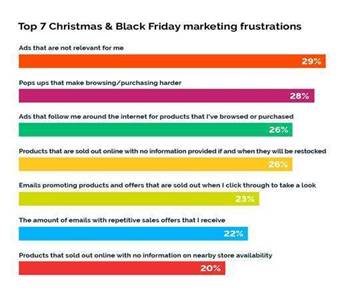
Mike Austin, CEO & co-founder Fresh Relevance said: “After a disruptive year for the retail sector, it’s positive to see that consumers are still set on spending money this festive season. But competition is going to be fiercer than ever. What retailers cannot do is make assumptions about Christmas shoppers’ behaviour or preferences in the months ahead, as like many other areas of life, this too is being impacted by the pandemic. Understanding what’s important and what isn’t – and providing the right experience to customers, no matter how they are interacting – will be critical to encourage them along the purchase journey.
“Convenience and ease are key factors in decision making this year, so providing real-time information is becoming more important for consumers. Consumers want information about when items they like will be restocked and local store availability. They will be annoyed by emails promoting products and offers that are sold out when they click through. Marketing and eCommerce tactics that are powered by real-time data should be a bigger priority for retail brands during the Christmas shopping season in order to provide the relevant and positive experience that ultimately drives purchases and long-term customer value.”
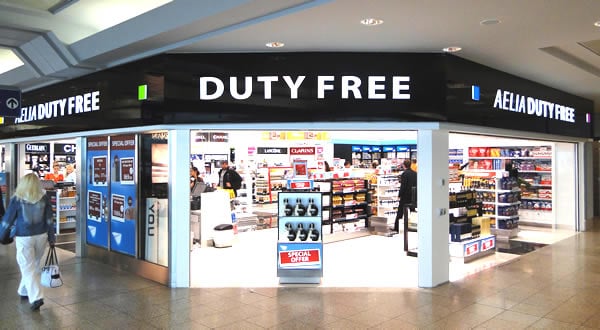







Share